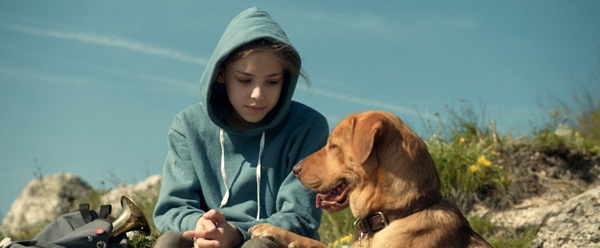Points should always be given for a unique story or a familiar story told in a fresh and startling way. If anything, White God deserves that much. It will surprise you. There’s plenty of unique imagery, and there are dogs. Lots and lots of dogs. Essentially, the movie conflates two stories: a coming-of-age tale and the making of an uprising. While the former is familiar, though very well done, it’s the latter that will get the most attention as the rebellion is of the canine variety.
In modern-day Hungary, a law has been passed that all mixed-breed dogs must be registered and a tax then paid. Thirteen-year-old Lili (a superb Zsofia Psotta) is spending the summer with her dad, Daniel (Sandor Zsoter). Her mother, separated from Daniel, neglects to tell him that Lili’s dog, Hagen (played by two pooches, Luke and Bodie), will be doing the same. This irritates Daniel to no end. They are in the midst of a contentious divorce, and Daniel sees this as an affront.
Hagen is about the sweetest thing you’ll ever see. A beautiful, butterscotch pit bull/something else mix, he is affectionate and loving. Thus, Lili and Hagen are inseparable until Daniel, in a fit of anger and frustration, pulls Hagen out of his car and leaves him on the side of the highway to fend for himself.
After his abandonment, Hagen is resourceful and resilient: he escapes from dog catchers, the pound, and illegal dog fights, and eventually he toughens up. Understandably, he develops an anti-social attitude toward his abusers. Meanwhile, as she searches for him, Lili starts coming out of her shell. Her human connections strengthen, while her need for Hagen’s love decreases.
Director Kornel Mundruczo plays this out as a kind of cautionary tale grounded in the here and now. Yet there is a fable-like feeling to the proceedings, particularly when Hagen meets a pack of city dogs at a muddy puddle (which in dog terms, is probably an oasis). In addition, the dogcatchers take on the aura of Stormtroopers (both of the Nazi and Star Wars variety), and we come to realize that Hagen is an uncommonly smart dog and a natural leader. But boy, is he pissed and…well, you can probably guess what happens next.
I was along for about two-thirds of the film with some minor quibbles, but the last third enters intof bombastic, silly terrain, echoing the classic (to me) Conquest of the Planet of the Apes (1972). Once the dogs target specific people that have done Hagen wrong, all pretense of reality goes out the window and we move from Planet of the Apes to Jaws: The Revenge. One poor soul happens to be eating at a deserted café (I guess dogs really do have excellent sense of smell). The end, though elegantly filmed, ranks pretty high on the oh-come-on meter, taking the “music has charms to soothe a savage breast” quotation to an absurd level.
White God has some honesty to it. Lili’s emotional growth as she struggles to understand her cold, distant father is particularly moving, and we feel for Hagen as he discovers the darker side of our treatment of animals. Yet Mundruczo is conflicted. He made a coming-of-age film when he really wanted to make a movie about dogs. It seems he split the difference and shortchanged both.

















Leave A Comment